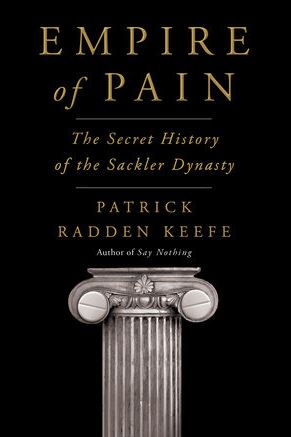There are family secrets, and then there are family secrets of the Sackler variety: obfuscations that span years, decades, and even generations; the ramifications of which irrevocably changed the pharmaceutical industry, indirectly led to the opioid crisis in America, claimed hundreds of thousands of lives, and shattered families of all racial and socioeconomic backgrounds. These devastating secrets are laid bare in Patrick Radden Keefe’s new book Empire of Pain: The Secret History of the Sackler Dynasty.


Patrick Radden Keefe
While many adults in the United States likely recognize the drug names Valium and OxyContin, I would wager that few, until the past few years, had heard of the Sackler family, a family directly responsible for the success of both of these drugs. Arthur Sackler, the oldest of three doctor brothers, was the man responsible for using aggressive marketing techniques to turn Valium into the first $100 million drug in history. Though Arthur had a degree in medicine, he was really a jack of all trades and had a hand in purchasing or creating 20+ businesses which his younger brothers Mortimer and Raymond helped run. Because of the conflicts of interest between many of their businesses, the Sacklers kept their involvement and their family name separate and hidden from the day to day operations.

Among the Sacklers’ businesses were a pharmaceutical advertising agency (actually two, Arthur was a secret investor in the other “rival” agency, a fact that was only confirmed after his death), medical journals, public relations firms, and drug manufacturers. With all of their corporate entities, the Sacklers could directly, “develop a drug, have it clinically tested, secure favorable reports from the doctors and hospitals with which they had connections, devise an advertising campaign in their agency, publish the clinical articles and the advertisements in their own medical journals, and use their public relations muscle to place articles in newspapers and magazines” (Radden Keefe, 89). This highly successful – and ethically questionable – formula is how Arthur directly targeted doctors to sell Valium for the pharmaceutical company Roche. When the Sacklers purchased Purdue Frederick, their own small drug manufacturing company, they used the same model to promote and sell a new drug developed by them; a drug that would go on to become exponentially more successful than Valium. That drug was OxyContin.
The Sacklers went to great lengths to keep their name from the family businesses, but the opposite held true for their philanthropic endeavors. To the upper echelons of society, the art world, philanthropists, and those in higher education, the Sackler name was known internationally for its adornment on museum wings, college buildings, medical schools, and centers for the arts; there was the Arthur M. Sackler Gallery at the Smithsonian, Sackler School of Graduate Biomedical Sciences at Tufts, the Sackler School of Medicine at Tel Aviv University, Serpentine Sackler Gallery in London, and many more. Author Radden Keefe spends a good portion of Empire of Pain detailing the Sacklers’ support for the arts and sciences. They made billions in business and also gave away hundreds of millions, but always conditionally and with very specific naming rights. People knew the Sacklers to be extremely wealthy, but they were so private that few knew the full origins of their wealth. This dichotomy – wanting their name to be synonymous with art and higher learning, but hiding their name from the very business that made them the money – in itself reveals much about the family.
Arthur, Mortimer, Raymond and other Sackler progeny were trained as doctors, so it is difficult to resolve the basic tenet of medicine – the Hippocratic oath: “First, do no harm” – with their actions; actions driven by greed with no regard for human life. Radden Keefe does an incredible job sifting through countless court documents and conducting his own research through hundreds of interviews to reveal breakdowns on many levels – human fallibilities, lack of oversight – that enabled the Sacklers to continue making, marketing, and selling OxyContin despite evidence that showed the product to be extremely addictive and highly susceptible to abuse. Reading about the callousness of the Sacklers and others complicit in their schemes alternately made my blood boil and then run cold. Last year, for the second time, the Sacklers’ privately held company Purdue Pharma pled guilty to three felonies: marketing and selling their product to healthcare providers despite knowing the dangerous opioids were being abused; lying to Federal agencies and fraudulently increasing the amounts of product being sold; paying kickbacks to providers to encourage them to write more prescriptions.
I’m not sure that I’m aware of any family in America that’s more evil than yours.”
Representative Jim Cooper to David Sackler during a hearing before the U.S. House of Representatives Oversight Committee in December, 2020
Details of the Purdue Pharma settlement are still being worked out but, as it stands, the Sackler family will not be held criminally responsible for their role in the opioid epidemic, thus avoiding jail time and keeping the majority of their personal wealth (a figure in the billions). Knowing this must be a bitter pill to swallow for anyone with a loved one affected by an opioid addiction, especially since the Sacklers have never publicly acknowledged any personal responsibility for their family’s part in the opioid crisis. It’s small comfort, but thanks to the doggedness of certain state prosecutors, journalists, activists, and writers such as Patrick Radden Keefe, one thing that the Sacklers have lost and will never recover is their good name. Empire of Pain exposes the secrets the Sackler family have worked so hard to keep buried, and this book is an important acknowledgment of the pain and suffering their greed have cost the American people. Highly recommended.
Categories: Books and More
Tags: Books and More


